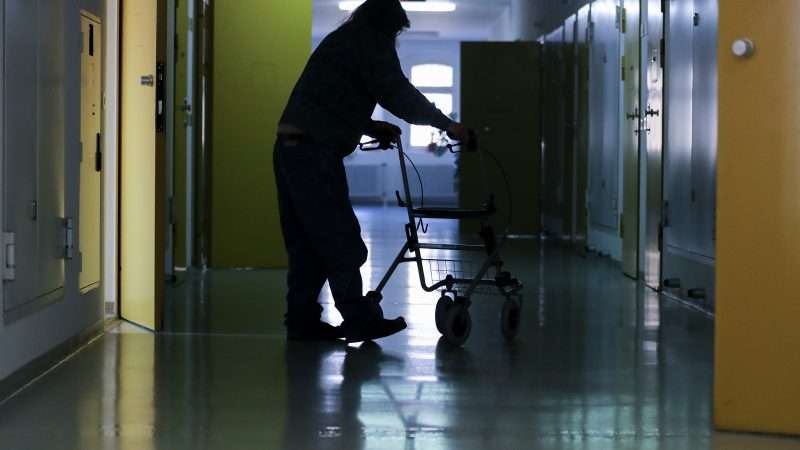
Arizona prison officials were deliberately indifferent to "grossly inadequate" medical and mental health care, violating inmates' Eighth Amendment rights, a federal judge ruled Thursday in a long-running civil rights lawsuit.
Judge Roslyn Silver of the U.S. District Court for the District of Arizona agreed with the American Civil Liberties Union (ACLU) and several other law firms that the Arizona Department of Corrections, Rehabilitation, and Reentry (ADCRR) has been flouting the terms of a previous settlement over gruesome medical neglect in its prison and found that unconscionable delays and incompetence put incarcerated people at risk of grievous harm and even death.
"No legitimate humane system would operate in this manner," Silver concluded.
In an expert witness report filed during the trial in November, Tod Wilcox, medical director of the Salt Lake County Jail System, described several cases of preventable deaths that he says were offensive to him as a medical professional and showed that Arizona prisons put incarcerated people at unacceptable risks of harm.
The cases Wilcox reviewed included a paraplegic man that was left to physically deteriorate until his penis had to be amputated; a man with undiagnosed, untreated lung cancer lost 90 pounds and died "slowly and agonizingly" without pain medication; and a woman whose multiple sclerosis was ignored and misdiagnosed until she was left, at age 36, nearly completely paralyzed.
"A system that allows this level of sustained incompetence and cruelty, and fails to take decisive action to determine the causes of these myriad and horrific breakdowns and to ensure that the people involved in this case are thoroughly retrained and/or separated from service," Wilcox wrote, "is morally bankrupt."
Silver found Wilcox's testimony persuasive, concluding that a toxic combination of short-staffed and under-qualified nurses puts incarcerated Arizonans at an unacceptable risk of harm and death.
In contrast, she found that the testimonies of ADCRR officials and expert witnesses were "appalling and overwhelmingly contradicted by the evidence at trial." At the trial, ADCRR Director David Shinn not only denied that there were persistent health care problems in the system but testified that inmates' access to health care exceeded his own as a private citizen, a statement that Silver found "shocking" and "completely detached from reality."
Furthermore, Silver found that the ADCRR has "been aware of their failures for years and Defendants have refused to take necessary actions to remedy the failures. Defendants' years of inaction, despite Court intervention and imposition of monetary sanctions, establish Defendants are acting with deliberate indifference to the substantial risk of serious harm posed by the lack of adequate medical and mental health care affecting all prisoners."
The ACLU of Arizona, the Arizona Center for Disability Law, and the law firm of Perkins Coie LLP, have been litigating the case since 2012. The federal class action lawsuit followed media investigations and persistent allegations of fatally inadequate medical care by the ADCRR's medical provider.
The ADCRR agreed to settle the lawsuit in 2015 by taking steps to improve medical care inside its prisons. But the ACLU and several other law firms have repeatedly accused the ADCRR of failing to abide by the settlement agreement, and federal judges have agreed.
A federal magistrate judge fined the ADCRR $1.4 million in 2018. Silver held the department in contempt last February and fined it another $1.1 million for failing to meet the benchmarks for proper medical care. Silver also rescinded the settlement agreement, forcing the ADCRR back into court, where a civil trial began last November.
"This ruling really vindicates the overwhelming evidence that we presented showing that people in the prisons had been suffering pain, permanent injuries, and preventable deaths due to the failure to provide health care," says Corene Kendrick, deputy director of the ACLU's National Prison Project.
Silver also found that Arizona prisons' use of solitary confinement violates the Eighth Amendment. The ADCRR, Silver wrote, keeps "thousands of prisoners in restrictive housing units where they are not provided adequate nutrition, nor are they provided meaningful out-of-cell time for exercise or social interaction. Defendants' treatment of prisoners in restrictive housing units results in the deprivation of basic human needs. For years, Defendants have known of the deficiencies, highlighted by Court intervention and direction, and refused to take meaningful remedial actions."
The Eighth Amendment guarantees incarcerated people access to adequate health care, shelter, and hygiene, but as Reason has reported, medical neglect is widespread in American prisons and jails.
Silver's order stipulates that the court will find an expert to help craft an injunction to alleviate the unconstitutional conditions that prevail inside Arizona prisons.
The ADCRR did not immediately respond to a request for comment.
The post Federal Judge Rules Gruesome Medical Neglect in Arizona Prisons Violates Eighth Amendment appeared first on Reason.com.







